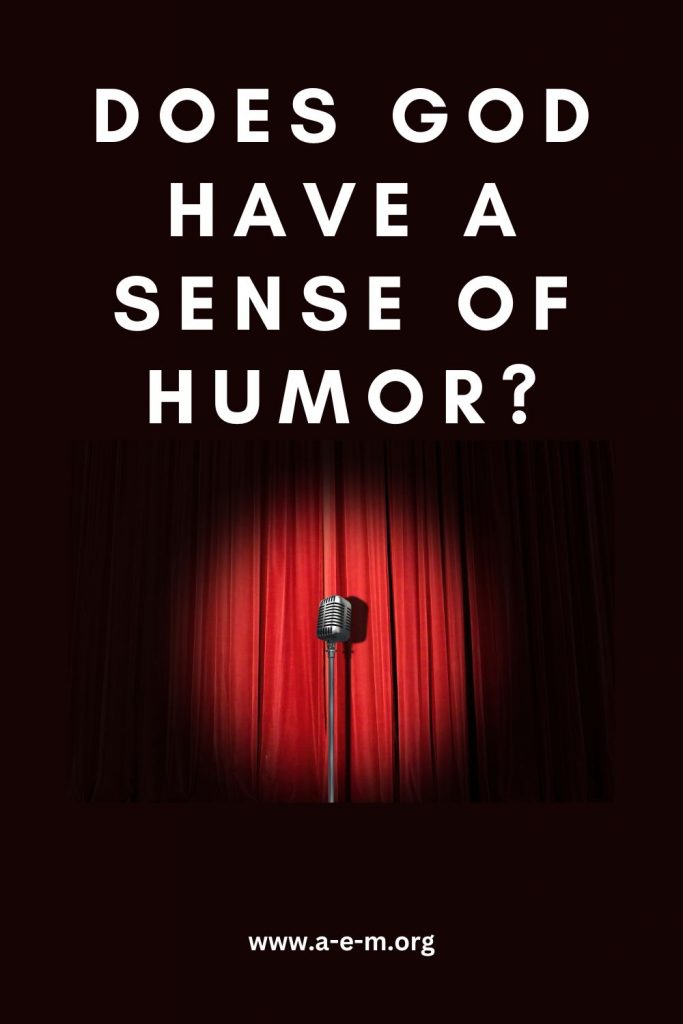Does God Have a Sense of Humor?
“A cheerful heart is good medicine “ – Proverbs 17:22
“There is a time to laugh” – Ecclesiastes 3:4
Does God have a sense of humor? Of course He does. Like the old joke – “How do you make God laugh? Give him your 5-year plan on how to fix yourself, your family and your country.” We can’t predict what will happen today, much less what will happen in 5 years. But you can just picture God laughing, thinking, ‘there, there, my little child…. I like your optimism, but your hubris is going to get you into trouble.” And in that moment, we can laugh at ourselves, let go of our prideful pretensions, and come back down to sanity.
We Need Comedy
We all love a good joke, a funny story over the dinner table, or a stand-up comedian who shows us the ridiculousness of everyday life. We long to have a good laugh. It is part of how God made us. If we didn’t laugh we’d probably cry or get depressed. I still remember Jerry Seinfeld’s line about the greatest fears men and women have: the number one fear people have is public speaking the number two fear is death. Jerry, in his typical fashion concluded, “So if you’re at a funeral, you’d rather be in the coffin than giving the eulogy.” He exposed the ridiculousness of our fears. But he also invited us to laugh while pondering the very heavy topics of fear and death.
This is the power of humor. Rabbi Shmuley Boteach said, “[Humor] Allows people to approach threatening subjects in a non-threatening way . . . Most people find it difficult to receive information from someone who has little or no sense of humor.”

Laughter as a Release Valve in Your Heart
Laughter is the release valve for our hearts. As T.S. Eliot succinctly put it, “mankind cannot bear very much reality.” One of the healthiest ways to handle the absurdities of reality is to laugh. We need to laugh at politicians the same way we can laugh at the religious and the pharisee. We need to laugh at those who are self-righteous and those with false humility. We need to laugh at religiosity, but most of all, we need to laugh at ourselves. No matter how smart, or how mature we are, we still make mistakes. If you can’t laugh at that, your heart has one foot in the grave. Comic relief makes the suffering in life bearable. We need that moment to laugh at the absurdities, to let out the tension and breathe deeper again. We need more Christians who can help us laugh.
The Danger of Being too Serious
Far too many artists of faith begin their creative careers focusing on serious subjects. It makes sense if you pause to think about it. After all, souls are at stake, and the culture is at stake. Don’t get me wrong. I care about where our culture is heading and about the condition of people’s souls. I’m just not convinced that being serious is the best strategy for addressing it.
For 7 years we produced an art show in West L.A. and we showed some amazing short films, musical performances and visual art. One of the frustrations in watching all the short film submissions was just how many short films were somber and started with almost the exact style of melancholic music. It was cliché, and tiresome. Somewhere along the way they forgot that even the Bible tells us, “There is a time to laugh” – Ecclesiastes 3:4
Creative Choices in Communication
Sometimes the best strategy to talk about something serious is the use of fantasy and imagination like the works of C.S. Lewis or J.R.R. Tolkien. Other times it is through parables. But sometimes the best medicine is humor and the resulting laughter. This is why the sacred text of scripture tells us there is a time to laugh (Proverbs 17:22), and that a cheerful heart is good medicine (Eccl. 3:4). The beauty of comedy is the surprise and the revelation of our own foolishness.
Wisdom in Comedy
Growing up, it became clear that comics could make you laugh at the same time challenge you to think. From Charles Schultz Peanuts cartoons to Bill Watterson’s Calvin and Hobbes, or Johnny Hart’s B.C. They made you chuckle, but they also made you consider the folly of how you lived and thought. Consider the sense of power we believe we possess over our circumstances:

(From Calvin and Hobbes, by Watterson)
We may see ourselves in little Calvin, thinking we have control, and power. Clearly God had the last laugh in this comic strip! Can’t you relate to Calvin’s expression in the last frame?
Comic Relief as a Literary Device & Spiritual Device
We usually think of comic relief as a literary device, that helps a story breathe. Maybe comic relief is also a spiritual device. Think about it: Animals don’t laugh and tell jokes. No other creature communicates with irony, satire or perfects comedic timing of a joke. Somehow the Image of God (Imago Dei) within us contains that spark of joy, self-awareness and the capacity for humility that results in laughter. Show me a man or woman with no sense of humor and I’ll show you a person with no spiritual depth. This is true of anyone. In fact, if you have a pastor who never laughs, finds life ridiculous or says something funny, you should find another church. Seriously. And yes, I am a pastor.
Consider this comment on the hearty laughter of one of the greatest pastors in recent centuries: Charles Spurgeon. William Williams, a fellow pastor who was a dear friend of Spurgeon wrote:
“What a bubbling fountain of humor, Mr. Spurgeon had! I laughed more, I verily believe, when in his company than during all the rest of my life besides. He had the most fascinating gift of laughter … and he had also the greatest ability for making all who heard him laugh with him. When someone blamed him for saying humorous things in his sermons, he said, “He would not blame me if he only knew how many of them I keep back.”
Christian Joy vs Stoicism
Stoics and Greek Philosophers believed in moderation: “there must be restraint of unseasonable laughter and tears and each of us must urge his fellow to consult decorum by utter concealment of all excess of joy or grief, whether the breeze of fortune is set fair, or, by a shift of circumstance, the fortunes of an enterprise are confronted by a mountain of difficulty” – a student of Socrates.
But this does not fit with Christ of the Bible: Jesus was hot with anger when turning over tables, and I am confident that Jesus and the disciples had time where they laughed until it hurt, or Peter laughed so hard he shot goat’s milk out his nose. Telling jokes about pharisees, self-righteous knuckleheads, and the disciples’ own spiritual ridiculousness.
Christianity: A Religion of Joy
G.K. Chesterton, in his book Heretics, shocked many of his contemporaries by showing that Christianity is fundamentally a religion of joy. In his book Orthodoxy, he wrote: “The pathos of Jesus was natural . . . the Stoics, ancient and modern, were proud of concealing their tears. He [Jesus] never concealed His tears; . . . supermen and diplomats are proud of restraining their anger. He never restrained His anger. He flung furniture down the front steps of the Temple, and asked men how they expected to escape the damnation of Hell”
And Christ not only enjoyed humor because he was human and experienced the silly and ridiculous parts of life. . .but he also used humor to teach. This is common to great teachers throughout history, because the benefits are obvious:
• Humor is disarming and helps break down barriers
• Humor is memorable
• Humor brings levity, and reminds us not to take ourselves too seriously
• Humor makes truth accessible in a new way
We need more Christians who help us laugh at ourselves, the world and the devil. We need to laugh at religiosity and self-righteousness as well as materialism, narcissism and the cultural issues of our time.
Healthy and Harmful Humor
The purpose of humor is to help us lighten up, to gain wisdom, and to enjoy life. But not all humor does that. Some humor, like the roasting of people, or movies like Jackass and Borat, go too far. The core value in this kind of humor is simply the surprise and shock of man’s foolishness, or even the mockery of others. There is no a-ha moment that helps reveal our own self-deceit. There is no revelation that helps us to become humbler. It is cheap, saccharine sweet humor – all of the fat and calories with no real benefit. It is vacuous.
We don’t need all comedy to teach, but it shouldn’t be foolishness alone. Pure foolishness will get laughs, but it fails to deliver anything more. There is no wisdom, and for some, it is an invitation to imitate the fools. (Hence the disclaimers and warnings not to try the stunts at home).
Why We Laugh
We laugh because we experience a joyful response, because we suddenly realize the absurdity, or incongruous nature of something we had assumed was reasonable.
Philosophers would speak of ‘equivocation’ to describe what happens in humor: it is the surprise that occurs when two things which are quite different are implied to be the same. One of the classic jokes illustrates this: If you think nobody cares if you’re alive, try missing a few car payments. (Two different types of caring, but you get the point).
Laughter is Evidence of the Gospel
If you’re a Christian and you don’t laugh – you may not understand the gospel. Jesus did not die to make Christians boring, dull, and dour. Joy and laughter are evidence of a heart redeemed. After all, we have something to laugh about. We can laugh at death, and at guilt and shame because Christ paid for all of it. None of it needs to constrain us.
Elton Trueblood wrote the book, The Humor of Christ, because of “an almost universal failure to appreciate an element in Christ’s life.” Christ was thoughtful, passionate, joyful, sorrowful, serious, and humorous. After all, he was fully human. It was a helpful book in pursuing this topic.
Elton Trueblood states in his book, “Kierkegaard believed the religious individual discovers the comical in the largest measure, partly because, in religion, men are acutely conscious of sharp inconsistencies. Every inconsistency, once it is really made manifest, is potentially humorous.” This is also true because we do not need to take ourselves so seriously. We know we are sinful, so we are not embarrassed and driven to shame or guilt when inconsistencies are discovered.
Humor in the Bible
In Exodus 32 we find Aaron was dealing with the grumbling masses at the bottom of Mt. Sinai. When they asked Aaron to make a golden calf, he had asked the people to give him all their gold in order to make a golden calf, and then we are told in verse 4, specifically that Aaron used a tool to fashion the golden calf.
But when Moses came down from Mt. Sinai in shock and anger, Moses asked Aaron how this happened, and in Exodus 32.24 Aaron says “they gave me the gold, I threw it in the fire, and out came this calf!” Aaron is a bumbling idiot, – like a kid caught stealing donuts covered in powdered sugar, and denies it while the mother can see the powdered sugar all over his lips and sprinkled over his shirt. There are many other instances of humor in the Bible. We just need to slow down long enough to see it.
The Power of Satire
Another kind of humor is the veiled humor of Satire: This is usually a well-crafted story based upon a logical form of argumentation called: reduction ad absurdum. It is proof by contradiction. First you assume a claim for the sake of argument and then proceed to derive an absurd or ridiculous outcome, which has the implied conclusion that the original claim must be wrong as it led to an absurd result.
Steve Taylor was genius at this, especially in his early Christian music videos and lyrics. Songs like Steeplechase, mocking Christians who switch churches all the time, or I want to be a Clone, mocking Christians who are all trying to look the same and act the same. The greatest examples of satire in writing are Modest Proposal by Jonathan Swift, and In Praise of Folly, by Desiderius Erasmus.
People are Watching You, Not Just Your Art
I remember in seminary enduring a class on preaching. Each of us walked to the front of the class and tried our best to preach with passion and clarity about the truth of the gospel. Some of us were trembling in fear, others were bold and confident. I’ll never forget the professor’s comment after one sermon. The professor asked the young man, “Do you think the gospel is good news?” He answered, “Well of course it is.” The professor retorted, “Well, one would never know that looking at your face or listening to your voice.” He then went on to encourage the man to loosen up and realize people will come to Christ through winsomeness and humor as much as through bold proclamation.
The Medium is the Message
Later on, I discovered the wonderful statement by Marshall McLuhan, “The medium is the message.” Form and Content are not independent aspects of art. They are interconnected. This is true in every area of life. The joy (or lack of joy) in the pastor is part of the message he is delivering. The artist’s testimony is part of the art she creates. And…the sense of humor we possess points to our sense of hope that good will triumph over evil in the end.
The creatives around you should know you are someone who has a good sense of humor. They should know you love a good laugh. Not at someone else’s expense, but at your own and at the recognition of the foolishness of humanity.
Taking Humor Seriously
Every night, millions of people end their evening with Jimmy Fallon or another late-night TV host because we all long to end the day with laughter. We’ve taken too many things seriously throughout the day, including ourselves, and we need to be reminded of the ridiculous, the silly, and the paradoxical nature of our humanity.
Though Christianity is not known for its laughter and humor, we ought to be. We should be known for our joy, cheerfulness, and our sense of humor. People should be drawn to the laughter of the redeemed. It is a sign of spiritual health, and something the Holy Spirit often uses.
So how’s your funny bone?
When’s the last time you had a good laugh?
Can you laugh at yourself?
Please share in the comments…. How do you use comedy? How do you think you’ll start using comedy after reading this?
Copyright © 2022 Joel & Michelle Pelsue. All Rights Reserved. Used with Permission.



4 comments on “Does God Have a Sense of Humor”